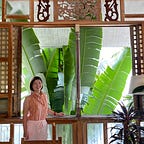On a Drive Out From the City — Nostalgia and Hope
Thoughts on what could have been and what could be, from a short road trip
Last weekend, my husband and I drove an hour and a half away to another city. It was our first excursion and long drive since the lockdown four months ago. We ventured out to visit the city we had planned to launch a business in. The coronavirus put a halt to our plans, but we kept our options open and visited to see if the city was ready.
As we drove, I observed life outside. With the easing of restrictions, more shops have reopened and the roads are busy with cars. Save for the face masks worn by people, it looked like a scene from an ordinary Saturday in life before COVID. Yet there were signs that these are still abnormal times. Outside the pier, there would usually be a line of cars waiting to ride a ferry to the white sand island across. There were none this weekend. Billboards on walkways above the street reminded people to stay home. In one town, hung from lampposts in the middle of the road were informational signs about the coronavirus. As we drove farther from the big city, the roads became less busy.
We stayed in our car the whole time, listening to Queen, Aerosmith, Journey, Van Halen, and other rock and roll greats. But we did not sing our hearts out. We could not. These times have been filled with anxiety, stress, and uncertainty. But there are things to be grateful for, good health above all, and that is what we remind ourselves of.
Arriving in our destination, we drove past restaurants. Some had a line of cars for drive-thru, others had motorcycles waiting to deliver food, a few had customers dining inside, keeping a distance from each other.
In normal times, we would have eaten lunch at a favorite restaurant. I would order, and finish, a full cup of rice with grilled fish and a bowl of vegetables stewed in coconut milk. Then we would go to another cafe and buy chocolate cake and cookies to bring home.
But we didn’t do these. We didn’t want to put ourselves and others at risk, so we stayed in our car and went to a fast food drive-thru for lunch. We parked under the trees and ate in our car, talking about our observations. The city was getting busy, but not quite like before yet — as with most every other place that COVID has infected. We have to continue living, and learn to live with the pandemic.
As we drove back home, I reflected again on how the coronavirus has changed our lives, our countries, and our future. I am still of the hope that things will go back to normal after a vaccine is found and given to every human being. But what is normal? Will things really go back to the way it was pre-COVID — when we could freely gather together, travel to far off places, and conduct business as usual? Maybe, but not for a few years. And what used to be our normal will be replaced by the next normal — of working from home, social distancing, and online shopping and entertainment.
As I looked at the shapes and structures outside, I felt nostalgic for what has been, and sadness for all that we have lost during this pandemic. Lives, jobs, businesses, opportunities, freedom to move.
And yet, the break also offers a start to intentional living. Intentional with how we spend our time, efforts, and attention. With so much time on our hands, how do we use it in the way that makes us healthy, happy, and productive?
Intentional with our money. We think twice before spending. We plan for our savings and investments, because that is part of preparing for our future.
Intentional with our environment, by getting our daily dose of fresh air, exercising outside, watching the sky, moon, and stars, watching the birds fly and listening to them sing.
Intentional with our interactions. These days, love is expressed by making each other safe, even if it means keeping our physical distance.
Intentional with our parenting. With the kids with us 24/7, our parenting is even more essential.
We returned home, and I quickly changed and washed my hands. I do this same routine before COVID, but this time I do it right away and more thoroughly. The kids were asleep for their afternoon nap, and I joined them in their room. Halfway through our trip, I began to miss them, even if we had only been away for two hours.
I felt happy to be back home. The drive was long but felt short, and even as I thought of the things that could have been, there was no point in what-ifs. Only, to look and move forward with hope, determination, and purpose.
